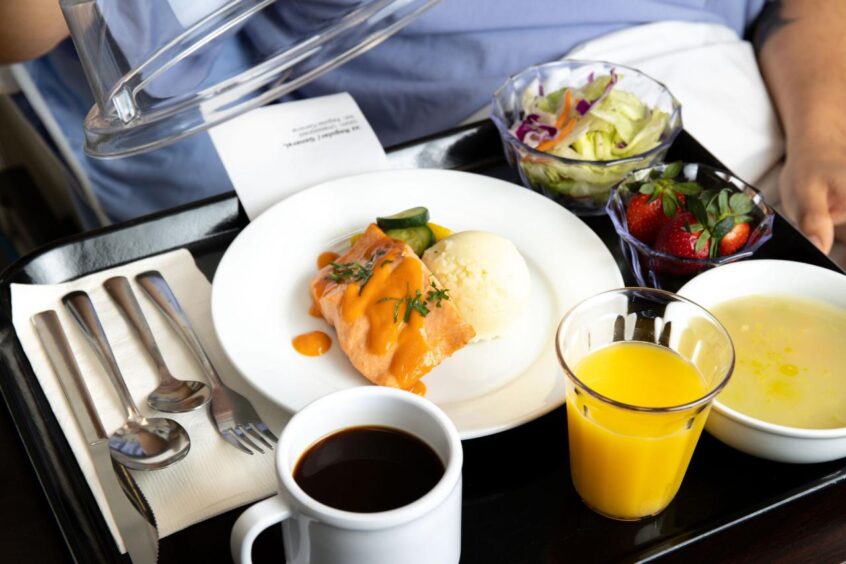“Food is the single strongest lever to optimize human health and environmental sustainability on Earth.”
This quote from the EAT-Lancet Commission supports the belief that what we eat plays a vital role in both human and planetary health. Dr. Annie Lalande, a surgical resident and PhD student in resources, environment, and sustainability at UBC, used it as the jumping off point for her recent presentation to VMDAS members.
Dr. Lalande’s doctoral thesis, supervised by Drs. Andrea MacNeill and Jiaying Zhao, focuses on understanding the potential of food as a medicine in health care to impact the health of patients, health-care systems, and the planet. She has been leading the evaluation of a novel planetary health menu piloted at VGH for inpatients. This is a collaborative effort by VCH’s Food Services team, VGH dietitians, the VCH Planetary Health team, the UBC Planetary Healthcare Lab, VCH Communications, and Executive Chef Ned Bell, with support from VCH leadership. Dr. Lalande was the third in the VA/VC Medical Staff Planetary Health Committee’s speaker series. The presentation was recorded and is available here (password: ?mK9n!JJ).
Food is critical to planetary health
Between 21 to 37 per cent of global greenhouse gas emissions come from food production and post-production. These include direct and indirect emissions from agriculture and land-use change, waste disposal, catering and consumption, retail, refrigeration, storage/packaging processing, and processing.
“The largest driver of these emissions has to do with what we choose to produce. Animal-based proteins have a disproportionately large environmental impact as compared to plant-based proteins, so the biggest impact we can all have primarily comes down to the choices we make about what we eat,” emphasized Dr. Lalande.
She noted that 11 million human deaths each year are attributable to poor diets, which are now the leading risk factor for deaths worldwide. Healthy diets can take many forms, but in general are rich in fruits, vegetables, whole grains, nuts, and legumes. Processed meats, red meat, and sugary drinks top the list for poor dietary choices. Globally, humans currently eat 288 per cent more red meat and 293 per cent more starchy foods than is healthy for us, far exceeding what our planet can sustain while remaining healthy too.
Dr. Lalande addressed a couple of myths often associated with plant-forward diets.
“The idea that we can’t get enough protein from plants is outdated,” she said. “All plants contain a diversity of essential amino acids; the goal is to eat a variety. There’s also a myth that we can’t get all the micronutrients we need by only eating plants. With a little bit of thought, and supplementation in certain key cases, this too can be accomplished by eating a varied diet.”
Food in health care
More than 40 per cent of inpatients are malnourished and this significantly impacts their recovery. The added lengths of stay for malnourished patients alone adds $2 billion yearly in direct cost to the health-care system in Canada. Prior studies at VGH indicate that patient satisfaction with food is lower than industry standards, that nutrition is low in surgical patients, and that, as a result, food waste is high (up to 50-60 per cent of food served is thrown away). Furthermore, the menu was quite greenhouse-gas intensive, primarily due to its high reliance on animal-based proteins.
The increased attention paid to inpatient food brought together members of the UBC Planetary Healthcare Lab, Drs. MacNeill and Lalande, and VCH and Fraser Health food services staff, dieticians, sustainability teams, clinicians, VCH Indigenous Health, and Public Health, with support from senior leadership. Their team joined six others as anchor cohorts working with Nourish, a charitable organization and community of practice that works to leverage the power of food in health care to foster community well-being, promote equity, and mitigate climate change. Groups that had all been working on food interventions in their respective realms were now collaborating across silos, enabling them to dream bigger.

“With Nourish, we were forced to avoid talking about solutions, taking the time to understand all our respective roles, perspectives, and assumptions. It was hard at first!” Dr. Lalande laughed. “Yet, once we embraced the process; it forced us to dig deeper and define this wicked problem better. Rather than coming up with Band-Aid solutions, we could find more comprehensive and transformative ways to truly realize and actualize the critical role that food plays for our health, and that of our planet.”
The team first began to work at shifting perspectives. This included sharing information in talks and through resources, showcasing plant-based options at VPSA’s physician lunches, offering free and easily accessible healthy sustainable meals to on-call residents, and most recently, enabling the installation of an UpMeals vending machine next to the VGH Emergency Department that provides a wide range of healthy choices. They also created a resource to highlight the role that infrastructure plays in enabling sustainable food services in health care in collaboration with CASCADES, due to be released by May 2024. Still, the team was dedicated to bringing about changes to the inpatient menu and by early 2023, key changes had brought about exciting transformative potential.
VGH inpatient food services
Having planetary health entrenched as a VCH pillar was a gamechanger, enabling much more sweeping changes with leadership support. At about the same time, hospitals throughout the province regained ownership and control of their food services. With ownership over the menu, and a shared understanding of the importance of food for human and planetary health, key members of the team joined forces with more VCH food services collaborators, clinical dietitians, and long-time sustainability advocate Executive Chef Ned Bell. Together, they set out to pilot a planetary health menu pilot at VGH, with the goal to provide patients with a menu that is more plant forward, seasonal, sustainably sourced, culturally mindful, and which also reduces waste.
During menu development, the team initially tested 54 recipes, featuring a variety of proteins such as fish, poultry, cheese, eggs, tofu, soy protein, pulses, and nuts and seeds. They engaged patients partners, food services staff, and dieticians to provide feedback, and eventually landed on 22 recipes that would be served across the hospital during the pilot project. Launched last October, the pilot concluded on March 10 and was featured in a VCH news release, as well as the Vancouver Sun.
The new meals were served nearly 160 times, and the team interviewed almost 3,000 patients to obtain feedback and adapt the recipes to patient preferences every time. During the pilot, the VGH menu featured higher cultural diversity and protein diversity, with plant-based meals accounting for about 40 per cent of lunch and dinner offerings. Patient feedback was overall positive, with patients and patient partners appreciating the focus on flavour and quality of preparation. All patient partners who participated in the menu development process felt empowered to integrate more plant-based eating in their daily lives, finding out how delicious and exciting it could be. Many patients found themselves pleasantly surprised at how much they enjoyed these new dishes, plant-based or not, and eating more than they thought they would have had the food not been as appealing.
One patient even commented, “The fish was so good that with the endorphins, I forgot I was in pain for a little while!” highlighting the critical role that food can play in recovery.
Next steps
Dr. Lalande and her team will be completing the analysis of the pilot results over the coming months, and, given the early successes, there are already plans to start trialing plant-forward menus to patients at other VCH hospitals.
She confirmed that recipes for the home cook are in the works, and due to be released soon. Many people don’t know how to cook from a plant-based perspective, so a recipe collection will allow patients to continue with such a diet when they return home.
She emphasized that there are several impactful steps medical staff can take too.
“We all have our part to play! First, start with yourself,” she said, “what changes, even small, can you start making to your own diet? Then, consider your patients: talk about food with them, whether they are inpatients or outpatients. Share with them the evidence and the benefits of plant-forward choices; resources from Plant-Based Health Professionals and Dietitians of Canada are great for patients and staff alike. And there’s your network. Share your knowledge widely and elevate the role of food as a truly central part of health care.”
Feedback from the session
Fourteen of the 58 people who attended the session either online or in person completed the post-event evaluation survey. When asked what resonated most from the session, responses included:
- Dr. Lalande was speaking to healthy, low-carbon food options while we were eating them!
- Great work being done at VGH!
- Implications on health and importance of increasing plant-based [foods].
- It’s possible to change systems!
- The collaboration involved.
- Patient-centred approach.
- The need to change diets in hospitals is holistically important.
- How far we are from evidence vs. reality in practice. Impact of planetary health on personal health… connection not often recognized.
- The positive patient response.
- The sheer effort and perseverance despite resistance.
- Plant-based food is tasty and healthy.
Photos credit: Leila Kwok




